Journal of Southern Medical University ›› 2025, Vol. 45 ›› Issue (2): 304-312.doi: 10.12122/j.issn.1673-4254.2025.02.11
Pengwei HUANG( ), Jie CHEN, Jinhu ZOU, Xuefeng GAO, Hong CAO(
), Jie CHEN, Jinhu ZOU, Xuefeng GAO, Hong CAO( )
)
Received:2024-08-06
Online:2025-02-20
Published:2025-03-03
Contact:
Hong CAO
E-mail:hpw2024@163.com;gzhcao@smu.edu.cn
Supported by:Pengwei HUANG, Jie CHEN, Jinhu ZOU, Xuefeng GAO, Hong CAO. Quercetin mitigates HIV-1 gp120-induced rat astrocyte neurotoxicity via promoting G3BP1 disassembly in stress granules[J]. Journal of Southern Medical University, 2025, 45(2): 304-312.
Add to citation manager EndNote|Ris|BibTeX
URL: https://www.j-smu.com/EN/10.12122/j.issn.1673-4254.2025.02.11

Fig.1 Effects of concentration gradient of quercetin (QC) alone (A) and in combination with HIV-1 gp120. (B) on viability of primary rat astrocytes. ***P<0.001 vs 0 μmol/L. **P<0.01, ***P<0.001 vs HIV-1 gp120+0 μmol/L QC.
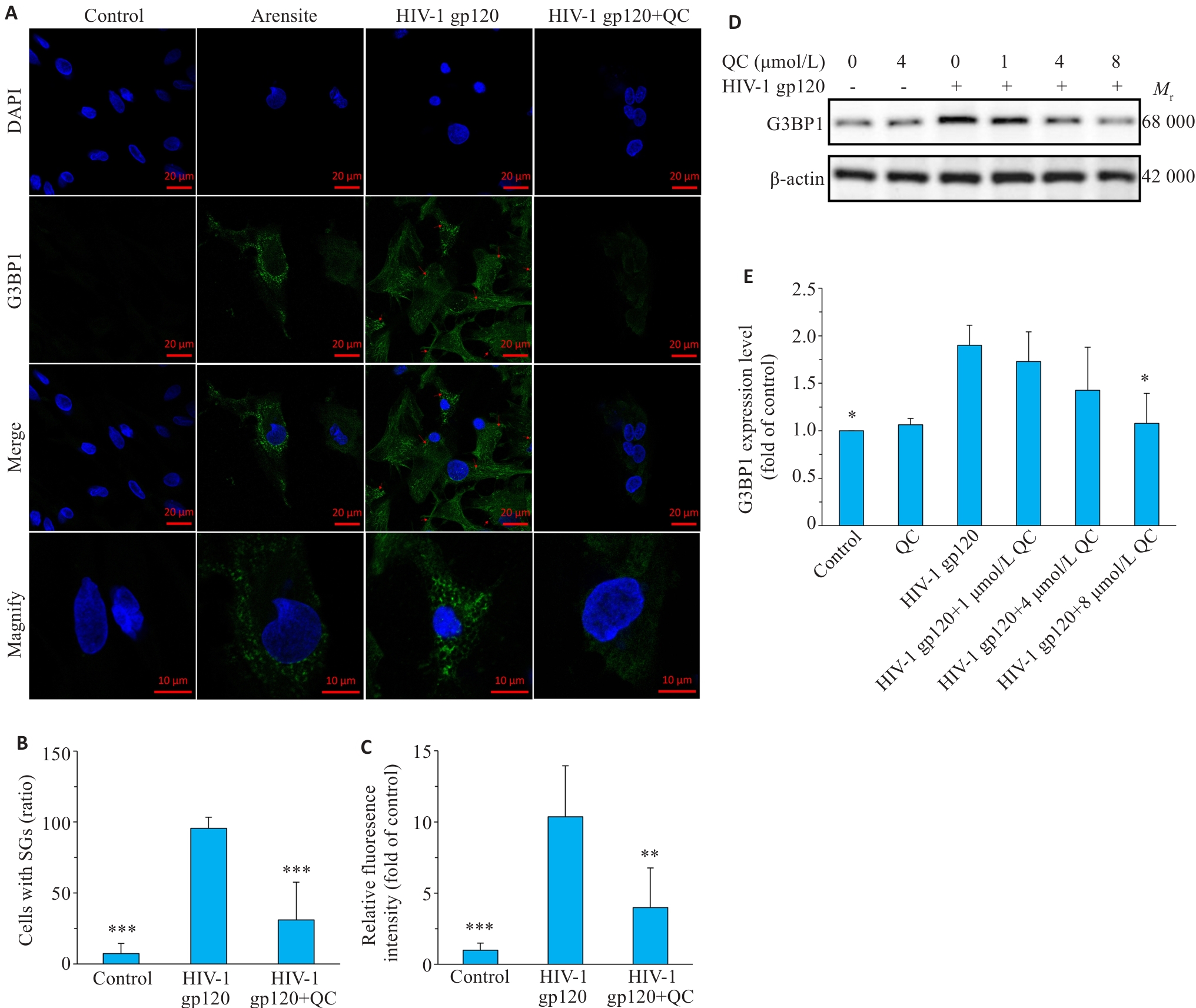
Fig.2 QC reduces the ratio of stress granule (SG)‑positive cells in HIV-1 gp120-induced primary rat astrocytes. A: Immunofluorescence staining of primary rat astrocytes. B: Ratio of SG-positive cells. C: Immunofluorescence intensity of G3BP1. D, E: Results of Western blotting for detecting G3BP1 protein expression level (fold of control). *P<0.05, **P<0.01, ***P<0.001 vs HIV-1 gp120 group.
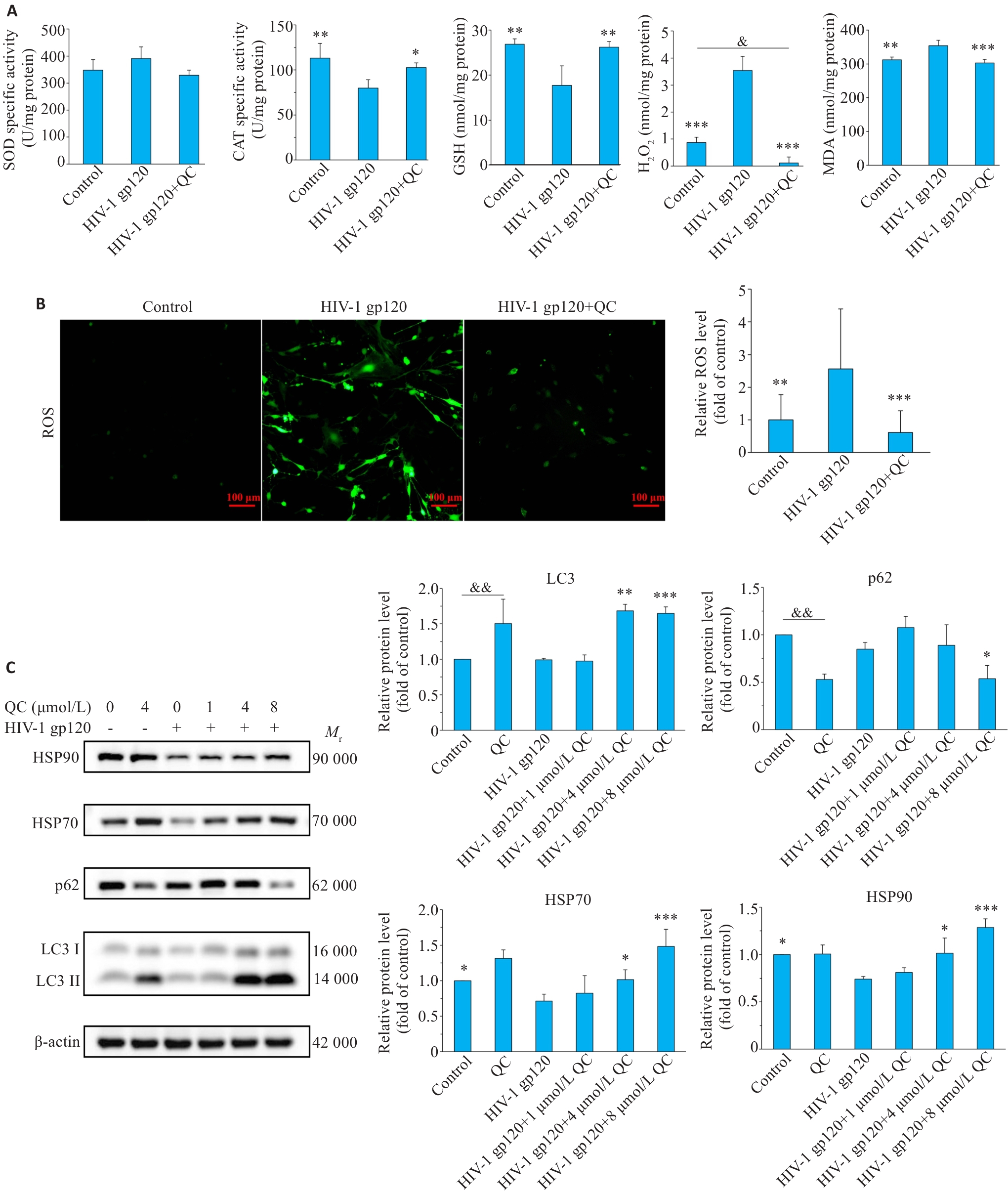
Fig.3 QC reduces oxidative stress and promotes expression of SG-depolymerizing proteins in primary rat astrocytes in vitro. A: Specific activity of SOD and CAT and contents of GSH, H2O2 and MDA in primary rat astrocytes in each group. B: ROS level and fluorescence intensity. C: Western blotting for detecting expressions levels of SG-depolymerizing proteins in primary rat astrocytes. *P<0.05, **P<0.01, ***P<0.001 vs HIV-1 gp120 group. &P<0.05, &&P<0.01.
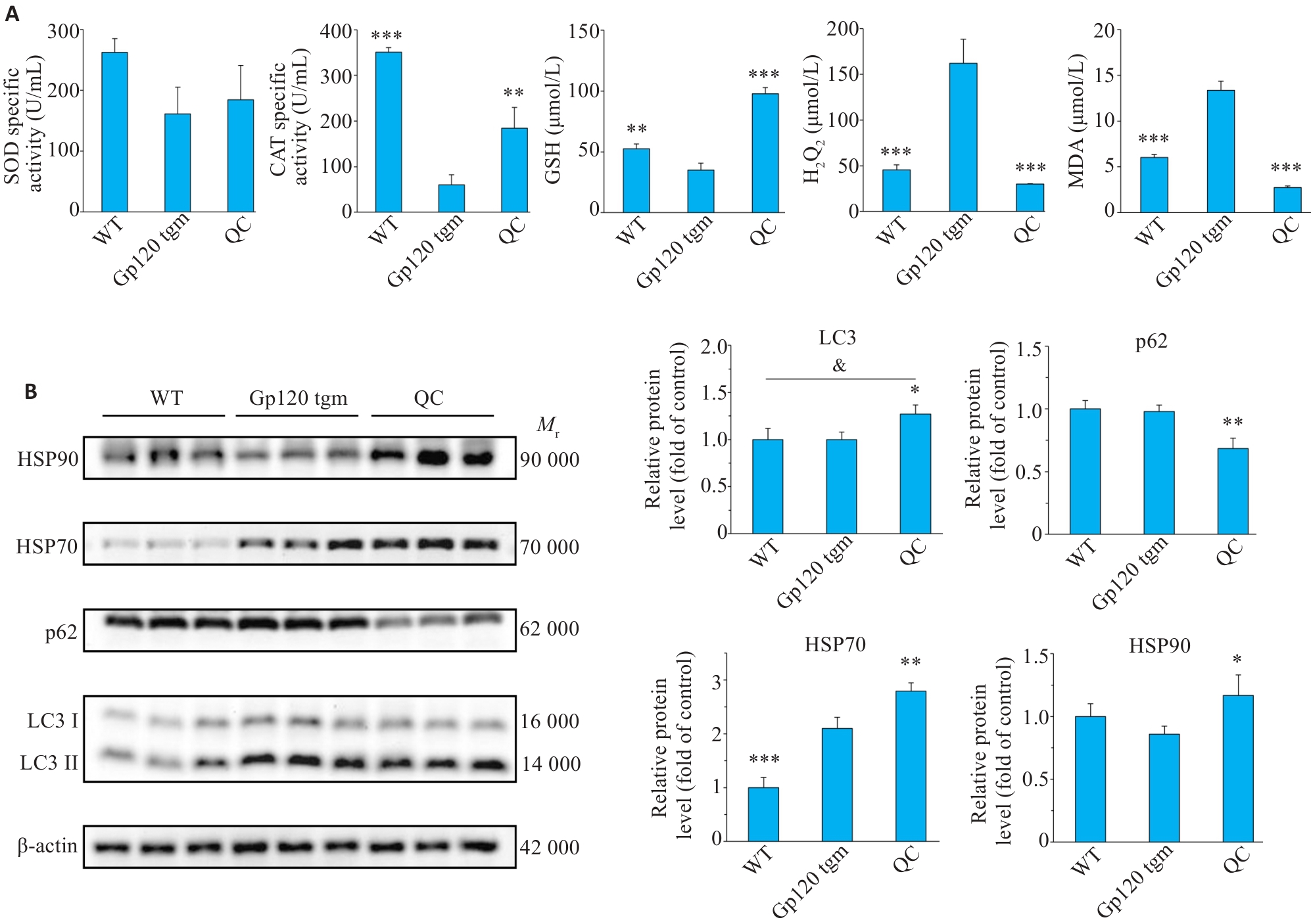
Fig.4 Effects of QC on oxidative stress indexes and expressions of SG-depolymerizing proteins in brain tissues of Gp120 tgm mice. A: Serum levels of SOD and CAT activities and GSH, H2O2 and MDA contents in each group. B: Results of Western blotting for detecting the expression levels of SG-depolymerizing proteins in the brain tissues of the mice in each group. *P<0.05, **P<0.01, ***P<0.001 vs Gp120 tgm group. &P<0.05.
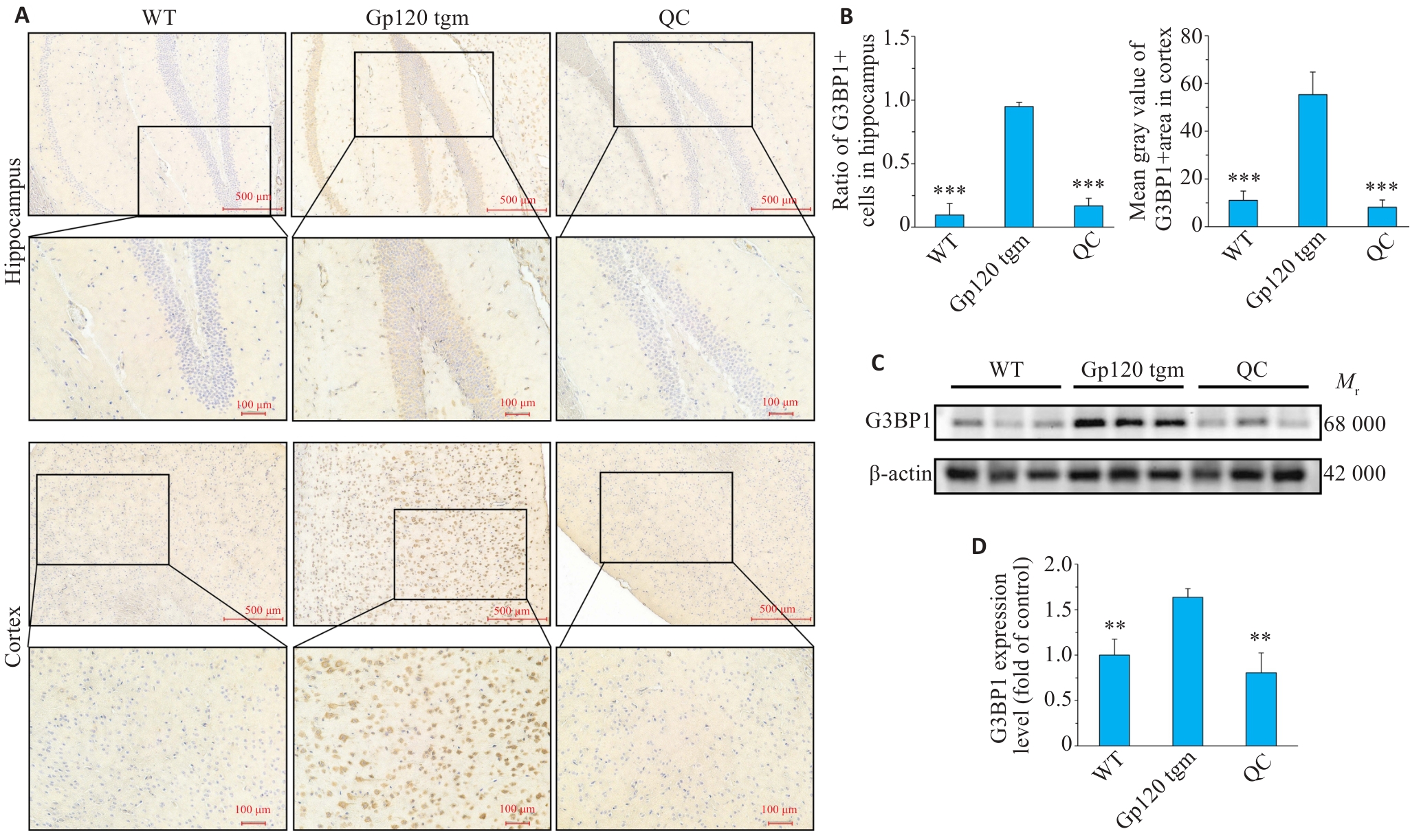
Fig.5 QC decreases the level of SGs in the brain tissues of Gp120 tgm mice. A, B: Immunohistochemical staining for G3BP1 in the hippocampus and cortex. C, D: Results of Western blotting for detecting the expression level of G3BP1. **P<0.01, ***P<0.001 vs Gp120 tgm group.
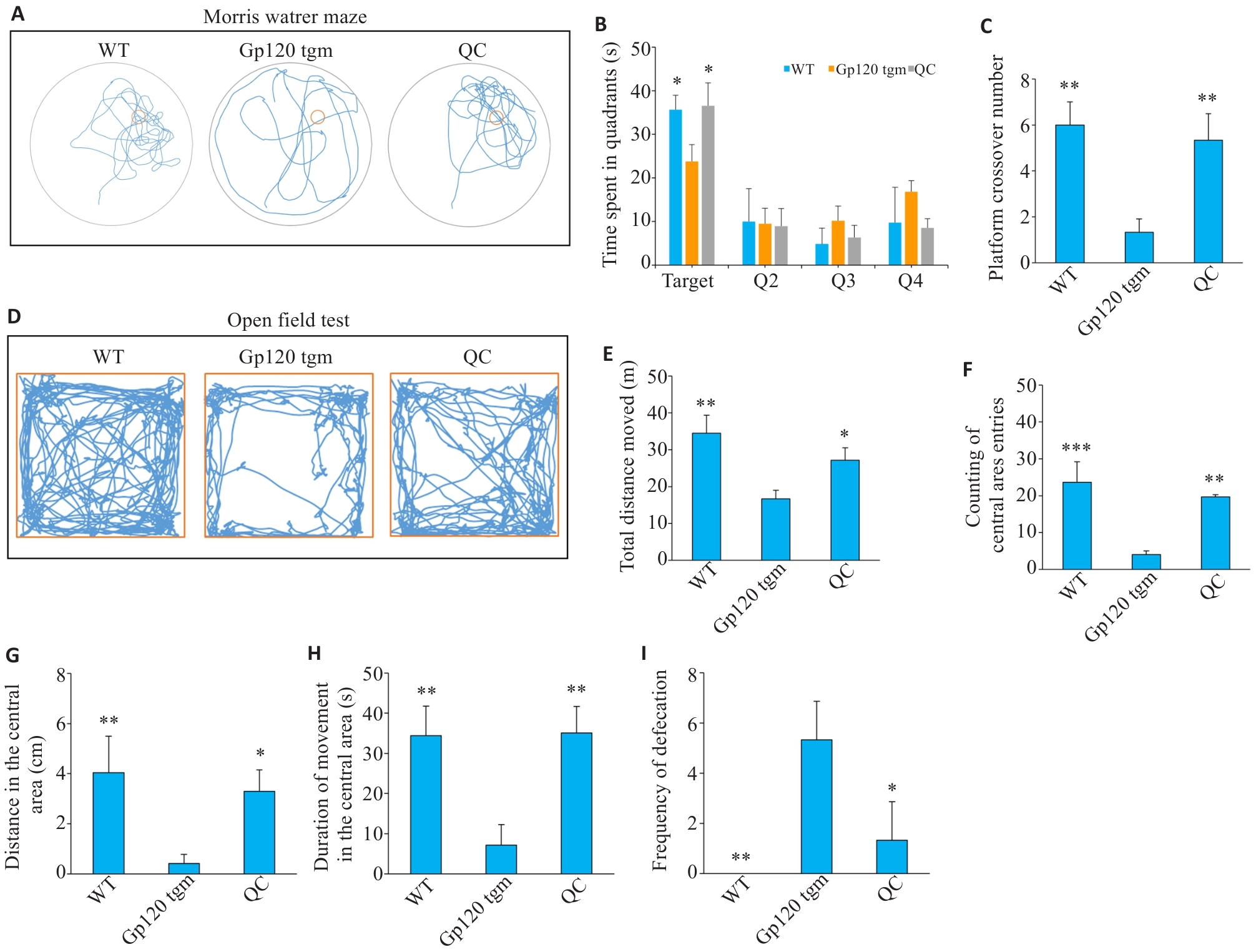
Fig.6 QC improves cognitive function of Gp120 tgm mice. A-E: Results of Morris water maze test (A-C) and open field test (D-I) in each group. *P<0.05, **P<0.01, ***P<0.001 vs Gp120 tgm group.
| 1 | Bailon L, Mothe B, Berman L, et al. Novel approaches towards a functional cure of HIV/AIDS[J]. Drugs, 2020, 80(9): 859-68. |
| 2 | Sreeram S, Ye FC, Garcia-Mesa Y, et al. The potential role of HIV-1 latency in promoting neuroinflammation and HIV-1-associated neurocognitive disorder[J]. Trends Immunol, 2022, 43(8): 630-9. |
| 3 | Thompson LJ, Genovese J, Hong ZZ, et al. HIV-associated neurocognitive disorder: a look into cellular and molecular pathology[J]. Int J Mol Sci, 2024, 25(9): 4697. |
| 4 | Niedzielska E, Smaga I, Gawlik M, et al. Oxidative stress in neuro-degenerative diseases[J]. Mol Neurobiol, 2016, 53(6): 4094-125. |
| 5 | Panas MD, Ivanov P, Anderson P. Mechanistic insights into mammalian stress granule dynamics[J]. J Cell Biol, 2016, 215(3): 313-23. |
| 6 | Tourrière H, Chebli K, Zekri L, et al. The RasGAP-associated endoribonuclease G3BP assembles stress granules[J]. J Cell Biol, 2003, 160(6): 823-31. |
| 7 | Wang C, Duan YJ, Duan G, et al. Stress induces dynamic, cytotoxicity-antagonizing TDP-43 nuclear bodies via paraspeckle LncRNA NEAT1-mediated liquid-liquid phase separation[J]. Mol Cell, 2020, 79(3): 443-58. e7. |
| 8 | MacKenzie IR, Nicholson AM, Sarkar M, et al. TIA1 mutations in amyotrophic lateral sclerosis and frontotemporal dementia promote phase separation and alter stress granule dynamics[J]. Neuron, 2017, 95(4): 808-16. e9. |
| 9 | Babaei F, Mirzababaei M, Nassiri-Asl M. Quercetin in food: possible mechanisms of its effect on memory[J]. J Food Sci, 2018, 83(9): 2280-7. |
| 10 | Deepika, Maurya PK. Health benefits of quercetin in age-related diseases[J]. Molecules, 2022, 27(8): 2498. |
| 11 | Costa LG, Garrick JM, Roquè PJ, et al. Mechanisms of neuroprotection by quercetin: counteracting oxidative stress and more[J]. Oxid Med Cell Longev, 2016, 2016: 2986796. |
| 12 | Fão L, Mota SI, Cristina Rego A. Shaping the Nrf2-ARE-related pathways in Alzheimer's and Parkinson's diseases[J]. Ageing Res Rev, 2019, 54: 100942. |
| 13 | Sabogal-Guáqueta AM, Muñoz-Manco JI, Ramírez-Pineda JR, et al. The flavonoid quercetin ameliorates Alzheimer's disease pathology and protects cognitive and emotional function in aged triple tran-sgenic Alzheimer's disease model mice[J]. Neuropharmacology, 2015, 93: 134-45. |
| 14 | Bahar E, Kim JY, Yoon H. Quercetin attenuates manganese-induced neuroinflammation by alleviating oxidative stress through regulation of apoptosis, iNOS/NF-κB and HO-1/Nrf2 pathways[J]. Int J Mol Sci, 2017, 18(9): 1989. |
| 15 | Cui ZF, Zhao XT, Amevor FK, et al. Therapeutic application of quercetin in aging-related diseases: SIRT1 as a potential mechanism[J]. Front Immunol, 2022, 13: 943321. |
| 16 | Xie RJ, Zhao WJ, Lowe S, et al. Quercetin alleviates kainic acid-induced seizure by inhibiting the Nrf2-mediated ferroptosis pathway[J]. Free Radic Biol Med, 2022, 191: 212-26. |
| 17 | Chen J, Zou JH, Huang PW, et al. KYNA ameliorates glutamate toxicity of HAND by enhancing glutamate uptake in A2 astrocytes[J]. Int J Mol Sci, 2024, 25(8): 4286. |
| 18 | Lun JX, Li YB, Gao XF, et al. Kynurenic acid blunts A1 astrocyte activation against neurodegeneration in HIV-associated neuroco-gnitive disorders[J]. J Neuroinflammation, 2023, 20(1): 87. |
| 19 | Toggas SM, Masliah E, Rockenstein EM, et al. Central nervous system damage produced by expression of the HIV-1 coat protein gp120 in transgenic mice[J]. Nature, 1994, 367(6459): 188-93. |
| 20 | González-Scarano F, Martín-García J. The neuropathogenesis of AIDS[J]. Nat Rev Immunol, 2005, 5(1): 69-81. |
| 21 | Kaul M, Garden GA, Lipton SA. Pathways to neuronal injury and apoptosis in HIV-associated dementia[J]. Nature, 2001, 410(6831): 988-94. |
| 22 | Toggas SM, Masliah E, Mucke L. Prevention of HIV-1 gp120-induced neuronal damage in the central nervous system of transgenic mice by the NMDA receptor antagonist memantine[J]. Brain Res, 1996, 706(2): 303-7. |
| 23 | Brandebura AN, Paumier A, Onur TS, et al. Astrocyte contribution to dysfunction, risk and progression in neurodegenerative disorders[J]. Nat Rev Neurosci, 2023, 24(1): 23-39. |
| 24 | Guo JL, Lee VMY. Cell-to-cell transmission of pathogenic proteins in neurodegenerative diseases[J]. Nat Med, 2014, 20(2): 130-8. |
| 25 | Ebrahimi-Fakhari D, Wahlster L, McLean PJ. Protein degradation pathways in Parkinson's disease: curse or blessing[J]. Acta Neuropathol, 2012, 124(2): 153-72. |
| 26 | Wolozin B, Ivanov P. Stress granules and neurodegeneration[J]. Nat Rev Neurosci, 2019, 20(11): 649-66. |
| 27 | Grimaldi G, Catara G, Palazzo L, et al. PARPs and PAR as novel pharmacological targets for the treatment of stress granule-associated disorders[J]. Biochem Pharmacol, 2019, 167: 64-75. |
| 28 | Protter DSW, Parker R. Principles and properties of stress granules[J]. Trends Cell Biol, 2016, 26(9): 668-79. |
| 29 | Ganassi M, Mateju D, Bigi I, et al. A surveillance function of the HSPB8-BAG3-HSP70 chaperone complex ensures stress granule integrity and dynamism[J]. Mol Cell, 2016, 63(5): 796-810. |
| 30 | Franzmann T, Alberti S. Ubiquitin protein helps cells to recover from stress[J]. Nature, 2021, 597(7875): 183-4. |
| 31 | Wippich F, Bodenmiller B, Trajkovska MG, et al. Dual specificity kinase DYRK3 couples stress granule condensation/dissolution to mTORC1 signaling[J]. Cell, 2013, 152(4): 791-805. |
| 32 | Chitiprolu M, Jagow C, Tremblay V, et al. A complex of C9ORF72 and p62 uses arginine methylation to eliminate stress granules by autophagy[J]. Nat Commun, 2018, 9(1): 2794. |
| 33 | Maxwell BA, Gwon Y, Mishra A, et al. Ubiquitination is essential for recovery of cellular activities after heat shock[J]. Science, 2021, 372(6549): eabc3593. |
| 34 | Sharma S, Raj K, Singh S. Neuroprotective effect of quercetin in combination with piperine against rotenone- and iron supplement-induced Parkinson's disease in experimental rats[J]. Neurotox Res, 2020, 37(1): 198-209. |
| [1] | Xiupeng LONG, Shun TAO, Shen YANG, Suyun LI, Libing RAO, Li LI, Zhe ZHANG. Quercetin improves heart failure by inhibiting cardiomyocyte apoptosis via suppressing the MAPK signaling pathway [J]. Journal of Southern Medical University, 2025, 45(1): 187-196. |
| [2] | Qing LIU, Jing LIU, Yihang ZHENG, Jin LEI, Jianhua HUANG, Siyu LIU, Fang LIU, Qunlong PENG, Yuanfang ZHANG, Junjie WANG, Yujuan LI. Quercetin mediates the therapeutic effect of Centella asiatica on psoriasis by regulating STAT3 phosphorylation to inhibit the IL-23/IL-17A axis [J]. Journal of Southern Medical University, 2025, 45(1): 90-99. |
| [3] | Yifan JIANG, Xiaorong LI, Jiayi GENG, Yongfeng CHEN, Bi TANG, Pinfang KANG. Quercetin ameliorates diabetic kidney injury in rats by inhibiting the HMGB1/RAGE/ NF-κB signaling pathway [J]. Journal of Southern Medical University, 2024, 44(9): 1769-1775. |
| [4] | Yuming ZHANG, Shicheng XIA, Linlin ZHANG, Mengxi CHEN, Xiaojing LIU, Qin GAO, Hongwei YE. Protective effect of Lonicerae japonicae flos extract against doxorubicin-induced liver injury in mice [J]. Journal of Southern Medical University, 2024, 44(8): 1571-1581. |
| [5] | Zhijun REN, Jianxin DIAO, Yiting WANG. Xionggui Decoction alleviates heart failure in mice with myocardial infarction by inhibiting oxidative stress-induced cardiomyocyte apoptosis [J]. Journal of Southern Medical University, 2024, 44(7): 1416-1424. |
| [6] | Jie CHEN, Chenxu LIU, Chun WANG, Li LI, Weiting TAO, Jingru XUN, Honghui TANG, Li HUANG. Exogenous leptin improves cerebral ischemia-reperfusion-induced glutamate excitotoxic injury in mice by up-regulating GLT-1 and GLAST expression in astrocytes [J]. Journal of Southern Medical University, 2024, 44(6): 1079-1087. |
| [7] | Guoxin LIANG, Hongyue TANG, Chang GUO, Mingming ZHANG. MiR-224-5p overexpression inhibits oxidative stress by regulating the PI3K/Akt/FoxO1 axis to attenuate hypoxia/reoxygenation-induced cardiomyocyte injury [J]. Journal of Southern Medical University, 2024, 44(6): 1173-1181. |
| [8] | MAN Hao, WANG Jianwei, WU Mao, SHAO Yang, YANG Junfeng, LI Shaoshuo, LÜ Jinye, ZHOU Yue. Jisuikang formula promotes spinal cord injury repair in rats by activating the YAP/PKM2 signaling axis in astrocytes [J]. Journal of Southern Medical University, 2024, 44(4): 636-643. |
| [9] | CHEN Guodong, LUO Suxin. Colchicine alleviates myocardial ischemia-reperfusion injury in mice by activating AMPK [J]. Journal of Southern Medical University, 2024, 44(2): 226-235. |
| [10] | LING Xuguang, XU Wenwen, PANG Guanlai, HONG Xuxing, LIU Fengqin, LI Yang. Tea polyphenols ameliorates acute lung injury in septic mice by inhibiting NLRP3 inflammasomes [J]. Journal of Southern Medical University, 2024, 44(2): 381-386. |
| [11] | Ping SHU, Mengke YUAN, Ke YANG, Weizhi HE, Li LIU. Quercetin suppresses pyroptosis in mouse fibroblasts by inhibiting the NLRP3/caspase-1/GSDMD pathway [J]. Journal of Southern Medical University, 2024, 44(10): 1874-1880. |
| [12] | SUN Xiaopeng, SHI Hang, ZHANG Lei, LIU Zhong, LI Kewei, QIAN Lingling, ZHU Xingyu, YANG Kangjia, FU Qiang, DING Hua. Exosomes from ectoderm mesenchymal stem cells inhibits lipopolysaccharide-induced microglial M1 polarization and promotes survival of H2O2-exposed PC12 cells by suppressing inflammatory response and oxidative stress [J]. Journal of Southern Medical University, 2024, 44(1): 119-128. |
| [13] | YE Hongwei, ZHANG Yuming, YUN Qi, DU Ruoli, LI Lu, LI Yuping, GAO Qin. Resveratrol alleviates hyperglycemia-induced cardiomyocyte hypertrophy by maintaining mitochondrial homeostasis via enhancing SIRT1 expression [J]. Journal of Southern Medical University, 2024, 44(1): 45-51. |
| [14] | ZHANG Ningning, QIU Qi, CHEN Yongfeng, SUN Zhengyu, LU Guoqing, WANG Lei, KANG Pingfang, WANG Hongju. Quercetin improves pulmonary arterial hypertension in rats by regulating the HMGB1/RAGE/NF-κB pathway [J]. Journal of Southern Medical University, 2023, 43(9): 1606-1612. |
| [15] | LIU Lilan, DENG Ruya, ZHOU Wenjin, LIN Min, XIA Lingzi, GAO Haitao. Mechanisms mediating the inhibitory effects of quercetin against phthalates-induced testicular oxidative damage in rats [J]. Journal of Southern Medical University, 2023, 43(4): 577-584. |
| Viewed | ||||||
|
Full text |
|
|||||
|
Abstract |
|
|||||